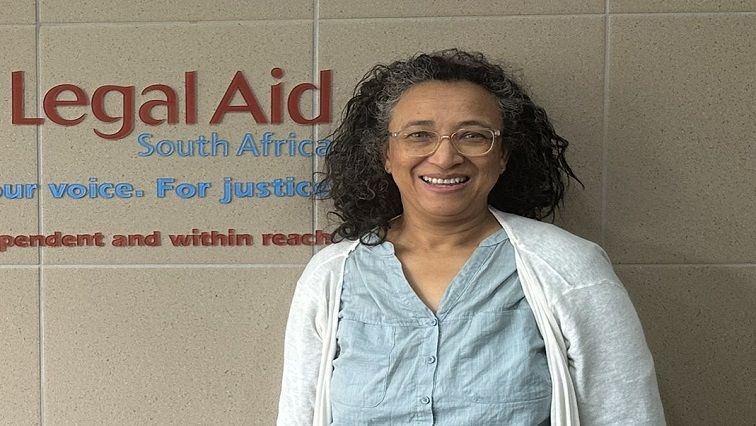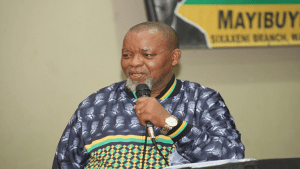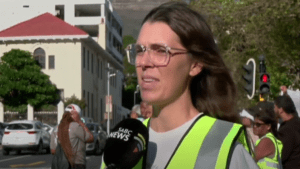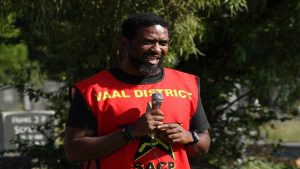The Deaf Community is waiting in anticipation for President Cyril Ramaphosa to sign the Constitution 18th Amendment Bill into law. The Bill seeks to make sign language the 12th official language under Section 6 of the Constitution. The Bill was recently passed in the National Assembly.
The process of amending the Constitution first went through Parliament’s Constitutional Review Committee before the 18th Amendment Bill was developed and passed.
Wilma Newhoudt-Druchen is a member of Parliament who uses sign language and she is deaf. She has been an African National Congress (ANC) member of the National Assembly since 1999 but had a two-year break between 2014 and 2016.
She has been a member of the Communications Committee and also sits on the Justice and Correctional Services Committee.
Newhoudt-Druchen is elated that the National Assembly recently passed the Constitution 18th Amendment Bill with more than 300 votes.
Newhoudt-Druchen says, “We actually just needed 267, two-thirds and we passed it with such a huge number and I would like to thank all political parties who supported us unanimously to pass the bill. You know the deaf community march in 2006 in all of the provinces. I would like to thank all the people who were involved in the march. Pansalb has given us support, the Department of Arts and Culture has given us support, and the Department of Basic Education has already implemented. So there are many role players, not just outside parliament. So we really want to thank them all for that.”
Anticipation for Constitution 18th Amendment Bill to be signed into law
‘We wish President signed it already’
The lawmaker and the deaf community can’t wait for President Ramaphosa to sign the Bill into law.
Newhoudt-Druchen says, “We wish it was yesterday, we wish the President signed it already yesterday. As soon as possible, but yes, we understand that there is a process. Parliament does need to inform the Presidency and I believe that the Department of Justice needs to be informed that Parliament has passed the bill and now it’s up to Parliament to draft a memo to present to the President for him to sign. So, we are looking forward to that. It’s taking too long but we hope it will be done soon.”
But how has parliament made it possible for persons with disability, including Newhoudt-Druchen, who uses sign language, to participate in the business of the National Assembly?
Secretary to the National Assembly Masibulele Xaso says, “Members of parliament have the right to participate fully in the affairs of parliament. To participate in the debate in committees of the house, and parliament must always ensure that it’s accessible to members of parliament but also to the general public but for members of parliament in particular for instance members who would require sign language or members who use wheelchairs who need to access the buildings and access the chamber, parliament has an obligation to enable that to happen. So obviously, members come to parliament through their parties. So within the parties, there would be some allowances. Disability allowances where applicable. And they would obviously be a contribution that parliament makes to the party and the party would make the arrangements for that specific member.”
DISCUSSION | Bill to officiate sign language:
Parliament’s role and sign language
But how has parliament made it possible for persons with disability, including Newhoudt-Druchen who used sign language to participate in the business of the National Assembly?
Secretary to the National Assembly Masibulele Xaso explains, “Members of Parliament have the right to participate fully in the affairs of Parliament, participate in the debate to attend sittings, either of committees or of the House, and Parliament must always ensure that it’s accessible to members of Parliament, but also to the general public, it must make provision so that it can be accessible, but for members of Parliament in particular, for instance, members who would require sign language or members who use wheelchairs who need to access the buildings and to sit in the chambers, Parliament has an obligation to enable that to happen.”
“Obviously, members come to Parliament through their parties. So, within the parties, there would be some allowances, and disability allowances where applicable. And there would obviously be a contribution that Parliament makes to the party to the members. So, the contribution would be made to the party, and the party would obviously make the arrangements for that specific member. But the principle is that parliament has to be accessible and members of parliament have to be able to participate fully,” adds Xaso.
And is the National Legislature ready to cater for more public representatives who use sign language, should they be elected to serve in Parliament in future? Xaso says they are.
“We are ready because there is precedent. We are ready because institutional arrangements are such that we must accommodate these arrangements. They are as entitled to be here anyone else, and are as entitled to be here as anyone else. The institution must do such that they don’t feel different from the rest of the people who are members of parliament, so my view based on what has been done before, the secretary to parliament has always made adequate arrangements and I have no doubt the secretary to parliament would continue to make such arrangements for members of parliament to participate fully,” Xaso concludes.
Calls mount for sign language to be recognised as the 12th official language in SA:
Significance
When asked about the significance of having the 12th official language, as next year will mark 30 years since South Africa achieved democracy, Newhoudt-Druchen says the DEAF Community wants to start celebrating sooner.
“Yes, I hope not next year. Before the end of this year we need to celebrate. 2023 we need to celebrate. Yes, the Deaf people are really looking forward to this. The Executive members of DEAFSA keep asking when is the President going to sign and I keep telling them, watch the space,” Newhoudt-Druchen adds.
Once President Ramaphosa has signed the Bill into law, it will not only make provision for sign language to become the 12th official language of the country. But this would also be the 18th time that the South African Constitution has been amended.






